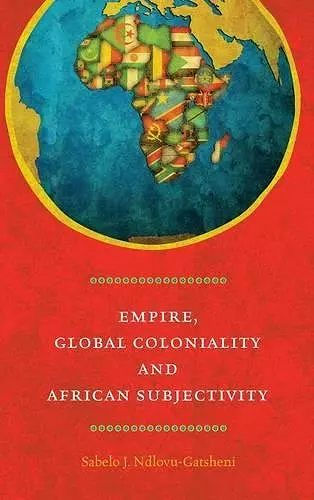Empire, Global Coloniality and African Subjectivity
Sabelo J Ndlovu-Gatsheni author
Format:Hardback
Publisher:Berghahn Books
Published:1st Jun '13
Currently unavailable, and unfortunately no date known when it will be back

Global imperial designs, which have been in place since conquest by western powers, did not suddenly evaporate after decolonization. Global coloniality as a leitmotif of the empire became the order of the day, with its invisible technologies of subjugation continuing to reproduce Africa’s subaltern position, a position characterized by perceived deficits ranging from a lack of civilization, a lack of writing and a lack of history to a lack of development, a lack of human rights and a lack of democracy. The author’s sharply critical perspective reveals how this epistemology of alterity has kept Africa ensnared within colonial matrices of power, serving to justify external interventions in African affairs, including the interference with liberation struggles and disregard for African positions. Evaluating the quality of African responses and available options, the author opens up a new horizon that includes cognitive justice and new humanism.
“At its best, this book offers interesting intellectual fodder for reflection, particularly on the question of, as Ivan Karp once put it, does theory travel? To what extent is modernist or postmodernist thought a tool kit that can be applied to and reformulated in response to a variety of historical and cultural formations and to what extent must it be seen as a colonizing force in its own right?... The book also provides valuable insight into the historical processes by which Africans formed continental and national subjectivities, and particularly into the role of the struggles against colonial rule, as well as racism and other pathologizing discourses, as part of those processes.” · H-Diplo
“…a fine, challenging survey of the African condition under continuing globalisation in which [the author] integrates an overview of state-of-the-art sociology, political economy and philosophy on the subject… This well written book on the persistence of empire in the era of globalization will delight and stimulate just as it leaves some thirsty for more. Given the long history of sharp disagreement, fuzzy consensus, or obfuscation of matters imperial, such an overview is much overdue.” · African Research & Documentation
“…Ndlovu-Gatsheni rejects modernist perspectives that present Africa as deficient [and],,, convincingly conveys the richness of African perspectives, arguing that problems are caused by how coloniality misappropriates Africa’s wealth. However, [the author] also demonstrates how some demagogical African governments, such as Zimbabwe’s ZANU-PF regime, are complicit in plundering the national resources on the pretext of confronting empire. [This book] book is an important addition to historiography that interrogates Africa’s current condition. It will be a positive step in the theorization of Africa by African scholars.” · Africa Spectrum
“Sabelo J. Gatsheni-Ndlovu’s book brilliantly…reveals empire’s invisible Eurocentricism and coloniality from an African perspective…[It] unapologetically deciphers how global power hierarchy was rooted in the very making of Western hegemony, which manifested itself in colonial subjugation and subalternization of Africans, and is the very essence of the continent’s wretchedness in the current world order today.” · Siphamandla Zondi, Director of Institute for Global Dialogue (IDG), South Africa
“A path-breaking book that bears eloquent testimony to the finest traditions of liberatory decolonial thinking and cannot be overlooked by all those with a stake in the transformation of Africa.” · Cyril Obi, Program Director of the African Peacebuilding Network, Social Science Research Council (SSRC)
“…a very insightful, timely and important contribution to scholarship on the post-colonial African condition and the many challenges that African societies face with regard to nation building and crafting common national identities in a rapidly changing world. It ranks up there with the best in the field with respect to the debates that it tackles. It is, in my view, a very welcome scholarly contribution to African studies in general and African history in particular.” · Alois S. Mlambo, University of Pretoria
“A most impressive book [that] is clearly structured, cleverly argued and exceptionally well written…Within the paradigm selected by the author, that is, a coloniality perspective, conceptual and methodological issues are addressed systematically and with considerable analytical rigour.” · Ian Phimister, University of Sheffield
ISBN: 9780857459510
Dimensions: unknown
Weight: 558g
288 pages